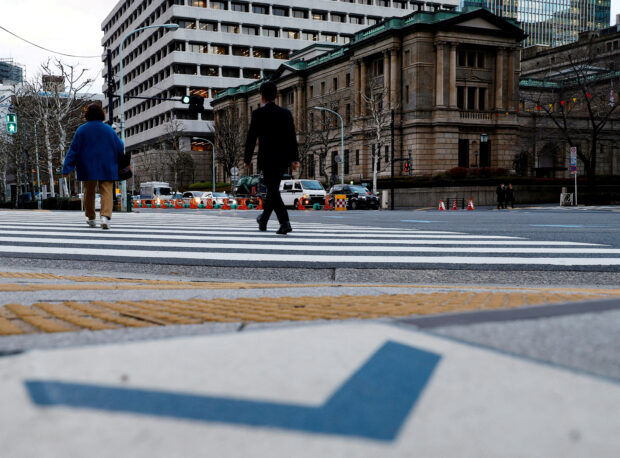Bank of Japan ends negative rates, closing era of radical policy

FILE PHOTO: People walk in front of the Bank of Japan building in Tokyo,Japan, January 23, 2024. REUTERS/Kim?Kyung-Hoon/File Photo
TOKYO — The Bank of Japan ended eight years of negative interest rates and other remnants of its unorthodox policy on Tuesday, making a historic shift away from a focus of reflating growth with decades of massive monetary stimulus.
While the move will be Japan’s first interest rate hike in 17 years, it still keeps rates stuck around zero as a fragile economic recovery forces the central bank to go slow in any further rise in borrowing costs, analysts say.
READ: Yen holds nerve as BOJ decision looms; dollar resurgent
The shift makes Japan the last central bank to exit negative rates and ends an era in which policymakers around the world sought to prop up growth through cheap money and unconventional monetary tools.
In a widely expected decision, the BOJ ditched a policy put in place since 2016 that applied a 0.1% charge on some excess reserves financial institutions parked with the central bank.
The BOJ set the overnight call rate as its new policy rate and decided to guide it in a range of 0-0.1% partly by paying 0.1% interest to deposits at the central bank.
“This would be the first rate hike in 17 years, so it has a lot of symbolic significance,” Izumi Devalier, head of Japan economics at BofA Securities, said prior to the BOJ’s policy decision.
“But the actual impact on the economy is very small,” she said, noting the BOJ will likely maintain its resolve to keep monetary conditions loose. “We would not expect a substantial rise in funding costs or households mortgage rates.”
The central bank also abandoned yield curve control (YCC), a policy that had been in place since 2016 that capped long-term interest rates around zero.
But in a statement announcing the decision, the BOJ said it will keep buying “broadly the same amount” of government bonds as before and ramp up purchases in case yields rise rapidly.
The BOJ additionally decided to discontinue purchases of risky assets like exchange-traded funds (ETF) and Japanese real estate investment trusts.
With inflation having exceeded the BOJ’s 2% target for well over a year, many market players had projected an end to negative interest rates either in March or April.
Markets are now focusing on Governor Kazuo Ueda’s post-meeting news conference for clues on the pace of further rate hikes.
The stakes are high. A spike in bond yields would boost the cost of funding Japan’s huge public debt which, at twice the size of its economy, is the largest among advanced economies.
An end to the world’s last remaining provider of cheap funds could also jolt global financial markets as Japanese investors, who amassed overseas investments in search of yields, shift money back to their home country.
Under previous Governor Haruhiko Kuroda, the BOJ deployed a huge asset-buying programme in 2013, originally aimed at firing up inflation to a 2% target within roughly two years.
The central bank introduced negative rates and YCC in 2016 as tepid inflation forced it to tweak its stimulus programme to a more sustainable one.
As the yen’s sharp falls pushed up the cost of imports and heightened public criticism over the demerits of Japan’s ultra-low interest rates, however, the BOJ last year tweaked YCC to relax its grip on long-term rates.